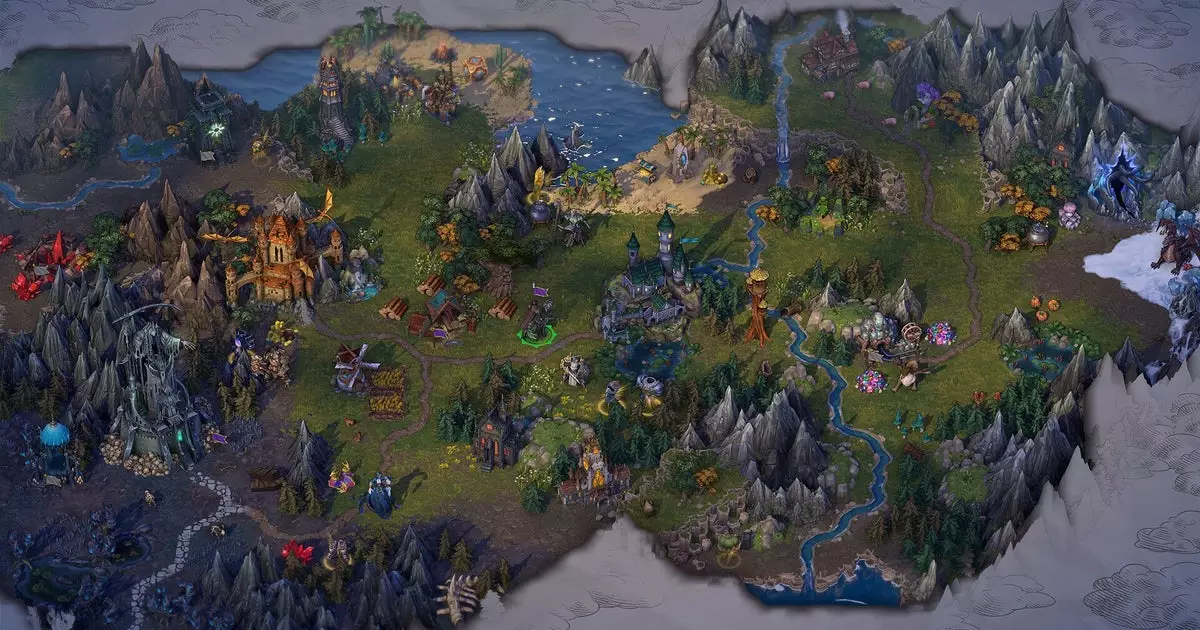In an industry notorious for its rapid evolution and fierce competition, Ubisoft’s decision to delegate the publishing duties of its anticipated strategy game, *Heroes of Might and Magic: Olden Era*, marks a noteworthy strategic pivot. Traditionally, large publishers like Ubisoft maintain tight control over their flagship franchises, leveraging their extensive resources for marketing, distribution, and brand consistency. Yet, by handpicking Hooded Horse—a company celebrated for niche strategy titles—to take the reins, Ubisoft reveals a willingness to adapt and experiment with alternative publishing models.
This move is not merely about divesting publishing responsibilities but appears to reflect a nuanced approach to balancing core brand management with fragmented resource allocation. Large corporations often face internal bureaucracies that slow decision-making; entrusting a specialized publisher like Hooded Horse suggests that Ubisoft recognizes the potential for niche-focused marketing and community engagement to better serve certain genres. Such a decision hints at an acknowledgment that traditional mass-market strategies may no longer be sufficient to reach modern audiences hungry for authentic, community-driven experiences.
The Implications for the Franchise and the Industry
While at face value, this cooperation might appear as a simple strategic outsourcing, its deeper implications radiate beyond the immediate scope of *Heroes of Might and Magic*. It symbolizes a growing recognition within the industry that legacy franchises can be revitalized through partnerships with indie and mid-tier publishers who possess a more intimate understanding of dedicated fanbases. Hooded Horse’s portfolio, rich with titles like Manor Lords and Norland, makes them a compelling steward for niche players, promising focused marketing aligned with gaming communities deeply invested in strategy immersion.
However, the move also raises questions about the long-term stewardship of the *Heroes of Might and Magic* franchise. Ubisoft retains ownership of the IP, implying that this arrangement is a form of strategic support rather than a shift in control. Will this partnership lead to more innovative gameplay or better community engagement, or is it merely a Cost-Cutting exercise amid internal restructuring? The latter seems plausible given Ubisoft’s recent fracturing and internal reorganization—dividing into separate entities and scaling back on certain titles. Such measures suggest a cautious approach, prioritizing financial optimization over expansive brand initiatives.
Behind the Curtain: What Is Ubisoft Really Doing?
This decision also spotlights the complex internal machinations within big gaming corporations. The split of Ubisoft into different entities, some focused on high-profile AAA releases and others on smaller projects, hints at a desire to streamline operations or placate investors through cost efficiencies. It is conceivable that Ubisoft’s involvement in publishing *Heroes of Might and Magic: Olden Era* was never intended to be comprehensive. Instead, by offloading to Hooded Horse, Ubisoft might be positioning itself to focus on primary flagship titles, leaving more niche, historically rooted projects to publishers with specialized expertise.
Furthermore, this move speaks to an evolving industry landscape where the lines between publishing and development are increasingly blurred. The statement that Hooded Horse will handle daily operations but that Ubisoft remains involved as the IP owner indicates a hybrid model—one that could become standard in the future. It allows the franchise to benefit from targeted marketing while reducing Ubisoft’s overhead and risk exposure. Whether this will yield a product that truly meets the high expectations of legacy fans is an open question—one that hinges on Hooded Horse’s ability to stay true to the franchise’s roots.
The Future of Strategy Franchises Amid Corporate Reshuffles
Ultimately, Ubisoft’s gamble on outsourcing parts of its portfolio exemplifies a broader trend: the rise of strategic collaborations in the gaming industry driven by the need for nimbleness and innovation. For a genre as historically rich and lore-intensive as *Heroes of Might and Magic*, entrusting the publishing process to a publisher like Hooded Horse could either result in a fresh infusion of passion and targeted craftsmanship or dilute the franchise’s essence if mismanaged.
It’s not just about marketing support or regional outreach, as Unfrozen has claimed; it’s about preserving the integrity and identity that made the original series beloved. The success or failure of this experiment could redefine how legacy franchises are managed in an era dominated by corporate restructuring and economic pragmatism. As the gaming world watches, the question remains: can these once-staunch corporate giants learn to trust more specialized, community-focused publishers to carry their cherished franchises forward into a new age?


Leave a Reply